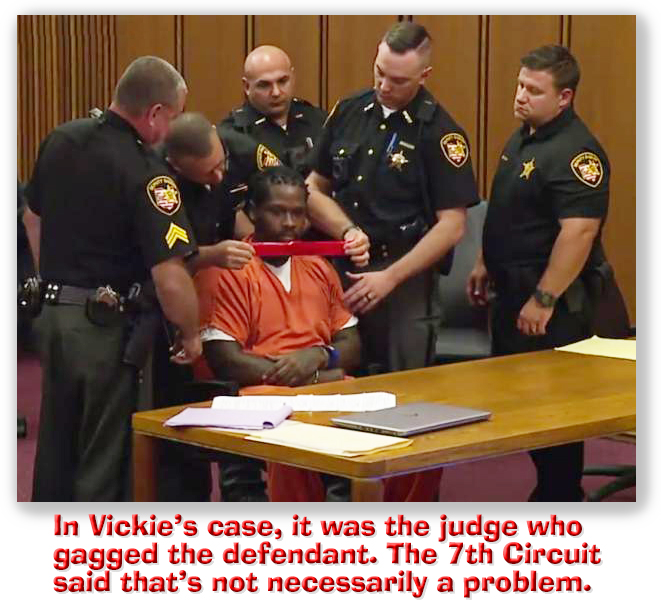We post news and comment on federal criminal justice issues, focused primarily on trial and post-conviction matters, legislative initiatives, and sentencing issues.

SANDBAGGED
 Too many prisoners are already familiar with Anders v. California, a Supreme Court holding which roadmaps a way for appellate counsel to roll on his or her client by filing a brief (called an “Anders brief,” of course) telling the court of appeals that the defense has no non-frivolous arguments to make on appeal, so the lawyer – who in all likelihood is court-appointed and is thus being paid by the public fisc) should collect his $200.00 and be allowed to go home.
Too many prisoners are already familiar with Anders v. California, a Supreme Court holding which roadmaps a way for appellate counsel to roll on his or her client by filing a brief (called an “Anders brief,” of course) telling the court of appeals that the defense has no non-frivolous arguments to make on appeal, so the lawyer – who in all likelihood is court-appointed and is thus being paid by the public fisc) should collect his $200.00 and be allowed to go home.
Vladimir Manso-Zamora found out that it’s even easier for appellate counsel to quit when appealing the denial of a compassionate release motion. Vlad’s district court appointed a lawyer to represent him on his 18 USC § 3582(c)(1)(A)(i) motion to be released due to COVID-19. When Vlad lost at the trial court, he demanded that his lawyer appeal. His lawyer did so, but – believing Vlad’s appeal to be meritless, and filed an Anders brief saying so.
 Last week, Vlad got impaled by the 6th Circuit. The Circuit accepted the lawyer’s brief and let him withdraw, but went beyond that, explaining that counsel had done more than necessary. Because the 6th Amendment right to appointed counsel extends to the first appeal of right and no further, the 6th held, the Anders procedure is not required except in a direct appeal. In cases other than direct appeals, “Courts may ask lawyers to represent prisoners, and many lawyers do so willingly, but having opted in as a service, counsel has not locked the door behind himself.”
Last week, Vlad got impaled by the 6th Circuit. The Circuit accepted the lawyer’s brief and let him withdraw, but went beyond that, explaining that counsel had done more than necessary. Because the 6th Amendment right to appointed counsel extends to the first appeal of right and no further, the 6th held, the Anders procedure is not required except in a direct appeal. In cases other than direct appeals, “Courts may ask lawyers to represent prisoners, and many lawyers do so willingly, but having opted in as a service, counsel has not locked the door behind himself.”
That’s not the only place a § 3582(c)(1)(A)(i) movant can get procedurally sandbagged. Vickie Sanders filed for compassionate release motion last summer, arguing she was at risk from COVID-19. The government filed its response, attaching new medical records showing that Vickie had already tested positive for COVID-19 and her symptoms had subsided a week later. Before Vickie could reply, the district court denied her motion, holding her criminal and medical history, not to mention the sentencing factors of 18 USC § 3553(a), weighed against her release.
Vickie argued she had a right to file a reply under the district court’s local rules, and the court wrongly denied her that opportunity. Last week, the 7th Circuit disagreed.
 District courts have “considerable discretion in interpreting and applying their local rules,” the Circuit held, provided they don’t violate litigants’ due process right “to respond to an argument or evidence raised as a basis to dismiss his or her claims.” But those rights are not violated until the district court’s dismissal order relies on the new arguments and evidence raised in the opposition.
District courts have “considerable discretion in interpreting and applying their local rules,” the Circuit held, provided they don’t violate litigants’ due process right “to respond to an argument or evidence raised as a basis to dismiss his or her claims.” But those rights are not violated until the district court’s dismissal order relies on the new arguments and evidence raised in the opposition.
Here, the district court “did not rely on a finding that Sanders is asymptomatic. Rather when considering Sander’s history and characteristics, the Court balanced her severe medical conditions with her ‘decades-long history of crime’… Thus, the district court’s denial of relief did not rely on new evidence, so it could not constitute a basis to dismiss Vickie’s claims in violation of her due-process rights.”
United States v. Manso-Zamora, Case No 20-1665, 2021 U.S. App. LEXIS 8227 (6th Cir. March 22, 2021)
United States v. Sanders, Case No 20-2561, 2021 U.S. App. LEXIS 8606 (7th Cir. March 24, 2021)
– Thomas L. Root

